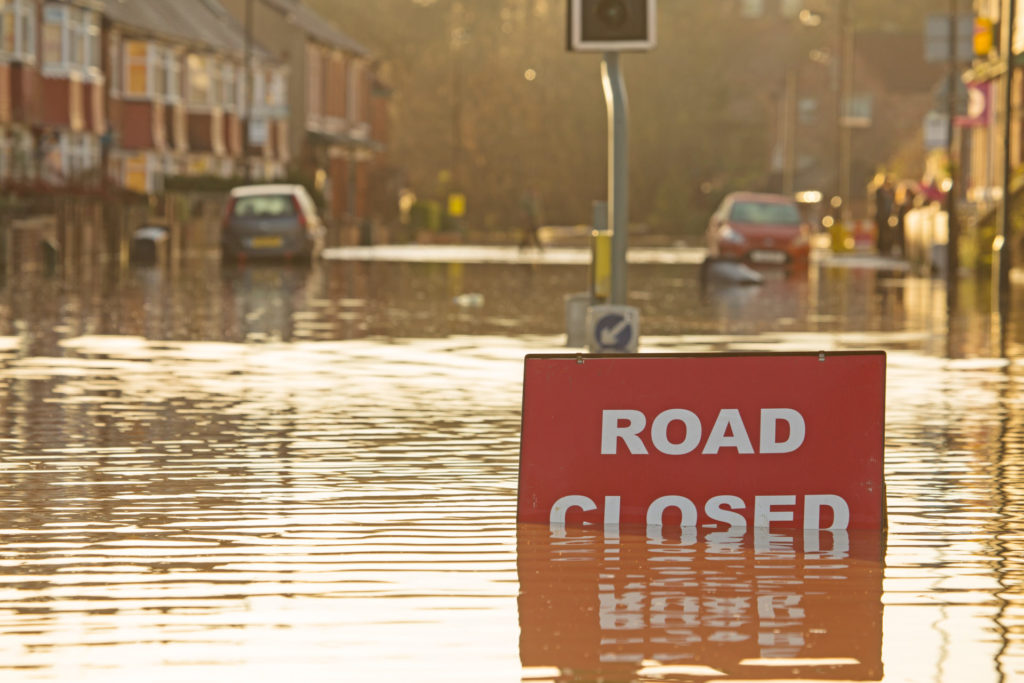
How to deal with more frequent storm and flood events causing devastation across the country is a major challenge set to get worse due to climate change.
The Met Office’s recent report – State of UK Climate 2020 – confirms that the country’s climate is changing. Recent decades have been warmer, sunnier but also wetter than that of the 20th century. The most recent decade has been on average 4% wetter than the previous and 9% wetter than 1961–1990 for the UK overall.
One in six properties throughout the UK – over 5.2 million – are currently at risk of flooding yet only a third of people who live in areas at risk of flooding believe their property is at risk according to a recent Environment Agency report.
Those who experience damage caused by flooding face a 50% increase in their chance of mental health problems such as stress and depression, while a quarter of people who have been flooded still live with these issues at least two years after the event according to research highlighted by the Environment Agency in January 2020.
Challenges such as these will be discussed at a Climate Change Summit held in Leeds on Tuesday 9 November to coincide with the United Nation’s COP26 event in Glasgow.
Lead Local Flood Authorities and partners across West Yorkshire are looking to embark on an innovative programme to make the region more resilient to flooding and climate change.
They took part in a workshop, facilitated by the Yorkshire Integrated Catchment Solutions Programme (iCASP), to develop work which started as part of a bid for funding from the Government’s £200m Resilience Innovation Programme.
All participants believe that their bid was so strong – although it was unsuccessful in receiving DEFRA funding on this occasion – they are enthusiastic about pursuing the ideas alongside looking for alternative funding opportunities.
“We held this workshop to gauge the level of interest in continuing with the programme set out for this bid which will help us manage flood risk across West Yorkshire. It is evident that there is a real appetite amongst our partners and political leaders to keep things moving,” said Jonathan Moxon, flood risk manager for Leeds City Council.
“We have some extremely good ideas for making innovative improvements and a group of passionate, capable and confident people who can make them happen. With the recent flooding in Germany, Europe and London – and also heatwaves, being resilient must be a top priority.”
Mark Wilkinson, Environment Agency team leader (West Yorkshire Programme and Partnerships), said: “I’m delighted that there is a real ambition to progress these exciting proposals. A strength of the programme is that learning will be shared across organisations and be accessible to other areas. It was a brilliant workshop with some really constructive ideas.”
Partners supporting the work include West Yorkshire Flood Risk Partnership, West Yorkshire National Flood Management (NFM) Operations Groups, the Environment Agency, the National Trust, Aire Catchment Partnership, Yorkshire Dales Catchment Partnership, Calder and Colne Catchment Partnership, Wharfe Flood Partnership, and River Holme Connections.
Initial tasks will be to develop a framework for delivering the work collaboratively, refine and look to streamline efforts and share learning through collaborative working.
Participants agreed to put together a bid for Yorkshire Regional Flood and Coastal Committees Local Levy funding to help progress the work alongside exploring other sources of funding. Five broad themes covered in the original proposal, which continued to be supported by participants, were:-
- Integrated water management solutions – for example, mitigating flood risk by introducing more sustainable drainage solutions (City of Leeds Council lead)
- Nature based solutions – for example, scaling up interventions across the Calder catchment (uplands to lowlands) and share learning through established networks (Calderdale Council lead)
- Property flood resilience – for example, working alongside a Bradford community to develop a scheme which enables premises to recover and restore quickly after a flood (Bradford Council lead)
- Community and voluntary sector – for example, pilot a holistic framework for community resilience working with Communities Prepared (Kirklees Council lead)
- Enhanced flood warning systems – for example, using emerging technology to provide a single platform which can be easily accessed by local risk management professionals, partners and the public, giving a real time picture of emerging flood events (Wakefield Council lead).
iCASP’s role in the programme will be to provide scientific advice, lead on monitoring and evaluation, facilitate learning opportunities and to disseminate information across the region – and further afield.
Dr Ben Rabb, impact translation fellow with iCASP, said: “Our role could be seen as the glue bringing together everyone’s resilient actions, develop a monitoring and evaluation framework across West Yorkshire based on the theory of change to create common outcomes, bringing along academics and scientists to feed into activities and to make sure the programme is aligned to national policy.”
A smaller working group is being set up to draw up proposals for the next steps based on the outcomes of the discussions. If anyone would like more information or to get involved email: icasp@leeds.ac.uk
